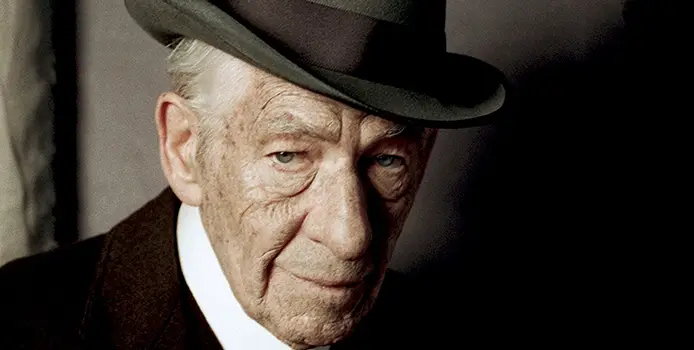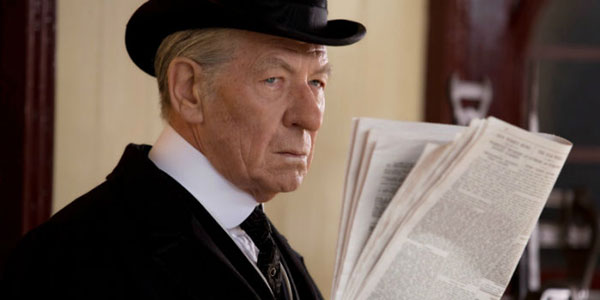MR. HOLMES: A Refreshing Take on a Classic Character

Alistair is a 25 year old writer based in Cambridge.…
There is something so endlessly fascinating about the character of Sherlock Holmes that prevents him from ever becoming boring to audiences, no matter how different Arthur Conan Doyle’s detective creation is to the pop-culture tastes of the time. The source material is so undeniably entertaining that even if it gets revised as an action blockbuster, as seen in Guy Ritchie’s two recent movies, or transplanted into the modern day, on Steven Moffat’s BBC series, it never loses any of its original charm. No matter how unique a new adaptation of the stories may be, Doyle’s stories are so widely revered that nearly every adaptation of them remains faithful to the essence of the characters, even if they may take a few liberties.
The most radical revisionist take on Holmes
In the UK, Sherlock Holmes has been a character owned by the public domain since 2000, highly likely for the influx of new adaptations that have been heading our way recently. Mr Holmes, the new film from director Bill Condon, is based on Mitch Cullin’s 2005 novel A Slight Trick of the Mind, and is one of the first attempts at revitalising the character since he became national intellectual property. Of this new wave of cinematic Holmes adaptations, this film is by far the most radical, if not the most enjoyable.

The film is set in 1947, with Holmes portrayed by Sir Ian McKellen as a frail 93 year-old who has long since retired to a life of bee-keeping in a quaint Sussex farmhouse. His memory is failing him in his old age, crippling his attempts to write a book in response to one of Watson’s many stories that apparently portrayed him incorrectly, in this case the only mystery that Holmes failed to solve. With the help of his housekeeper’s son (newcomer Milo Parker), he tries to remember the intricacies of the case, now more for closure and also for proof that he is still capable of doing so, rather than as a document to compliment Watson’s beloved retellings.
The movie is told in three different timelines: the modern day, as Holmes struggles with memory loss at home; a short while earlier, as he travelled to Hiroshima to pick up memory-rejuvenating “prickly ash” (I assume this takes place only a few months earlier, yet Holmes looks healthier in these scenes, making it hard to pinpoint) and twenty years previously on the final case he is still trying to solve.
What is thrilling about Mr. Holmes is that the case itself, a young woman who appeared to be descending into madness after two failed pregnancies, becomes irrelevant. The movie is really about Holmes finding closure and solving the case just as he effortlessly used to. Everybody seems to be obsessed with Watson’s stories, and even though he feigns a lack of interest, he can clearly be seen as attempting to live up to the expectations placed on him for one last time.
This meta-textual element of Holmes critiquing Watson’s stories to anybody who will listen, righting some wrongs, such as the fact that he never smoked a pipe or wore a deer-stalker hat, provides some of the film’s best moments. What makes it work is that it underplays its own surreality; seeing Sherlock Holmes go to the cinema to watch an adaptation of the case he is currently trying to resolve isn’t played for laughs, but instead as a man trying to work out how to regain his detective skills under the watchful-glares of audiences who still treat him more like a character than a human being.
Holmes is an enigma that the movie attempts to solve
Mr. Holmes is at its best when it becomes solely preoccupied with becoming a character study. It may be a cliché, but the only case Holmes needs to solve here is himself. He still has the Holmesian power of deduction, yet as a creation, the character has always remained an enigma, no matter what the adaptation suggests otherwise. For Holmes to have to solve the enigma that is at the very core of his being in order to solve his final case ensures that this is the most radical big-screen adaptation, since a character famous for being unreadable is now being forced into exploring his inner emotions.

Combined with the unsolved case he is writing about, this is his biggest challenge yet, albeit portrayed like a character study. This movie is not characterised by the high-energy action that fills the most recent film and TV reimaginings, in spite of offering a case that, in its own quiet way, has far higher stakes than anything the character has attempted previously.
Although Holmes’ retirement and subsequent bee-keeping hobby are documented in Conan Doyle’s story His Last Bow, on-screen the bees provide the only element that truly overshadows the movie as a whole, a single negative that outweighs the many positives. Without wishing to spoil the later stages of the film, the only action-packed sequences here involve bees. The idea of bees causing fatalities is strongly reminiscent of the Nicolas Cage-starring remake of The Wicker Man, a film that infamously climaxed with him screeching “Killing me won’t bring back your god-damn honey!” as townsfolk place his head into a helmet made of a giant bees-nest. The sequences aren’t similar in conviction, but the misplaced nature of such a scene in Mr Holmes (even if it does have consequences on the narrative as a whole) instantly brings the movie down a tier.

The movie should have remained a quiet character study, and for many audiences will remain one. For certain audience members though, any bee-related movie scene is always going to bring back the unwelcome memory of Nicolas Cage being stung in his eyes, made all the more unwelcome for getting in the way of what has been, up until this point, a truly exceptional movie.
Conclusion
Mr. Holmes isn’t another fast-paced adaptation of the character that pop-culture has become used to recently, but a quiet character piece that is radical in its introduction of a revisionist history for the character. It is a truly enjoyable film, exploring the depth of a character initially conceived as one-dimensional, leaving you walking out of the cinema with the restored belief that Holmes is one of modern English literature’s greatest creations.
Have you seen Mr. Holmes? What are the best adaptations of the character?
Mr Holmes is out now in the UK and on July 17 in the US. All international release dates can be found here.
(top image source: Icon Productions)
Does content like this matter to you?
Become a Member and support film journalism. Unlock access to all of Film Inquiry`s great articles. Join a community of like-minded readers who are passionate about cinema - get access to our private members Network, give back to independent filmmakers, and more.
Alistair is a 25 year old writer based in Cambridge. He has been writing about film since the start of 2014, and in addition to Film Inquiry, regularly contributes to Gay Essential and The Digital Fix, with additional bylines in Film Stories, the BFI and Vague Visages. Because of his work for Film Inquiry, he is a recognised member of GALECA, the Gay & Lesbian Entertainment Critics' Association.













